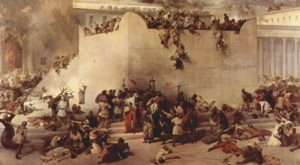[Greek] ζηλόω (zēloō), [Latin] aemulantes, [Latin] zelantes: to be jealous, to desire earnestly, to eagerly seek, to have a feeling against, to be zealous, to burn with desire, to be envious, to strive after, to exert oneself earnestly, to zealously seek, to be moved with jealousy, to have a zeal for; Act. 1:13, Lk. 6:15, Lk.17:5, Act.5:17, Act.13:45, Gal.1:14, Php.3:6, 1 Tim.2:14, 1 Pet.3:13, 1 Cor.12:31, 1 Cor.14:1, 1 Cor.14:12, 1 Cor.14:39, 1 Cor.13:4, Jas.4:2, Heb.10:27, Gal. 4:17, Act.7:9, Act.17:5

The Zealots were a group of political adversaries to Roman rule in Judea in 66-75 A.D.
Background Information:
Secular Greek: This term is most commonly used in the sense of to admire, to commend someone, and to commemorate by tragic dramatists (actors). This personal emotion of being stirred (enthusiastic) is used in a friendly or hostile way against someone or something. Such emotions involve indignation, wrath, grief, envy, and jealously. This term can also be used in the sense of striving for a respectable (admirable) code of conduct.
Old Testament: This term has a specific religious content involving God or God’s relationship with man. This zeal (jealousness) is closely linked to God’s holiness and power. There is no other similar usage in non-Jewish literature. I became resolutely devoted to her and strove persistently for good (Sir.51:18). Matthias was moved with fury and killed him upon the altar (1 Macc.2:24). Do not envy a sinner’s fame for you know what disaster awaits him (Sir.9:11). Do not envy the lawless man and choose his ways (Prov.3:31). He acquired such flocks, herds, and animals, that the Phillistines became envious of him (Gen.26:14). When Rachel failed to bear children to Jacob, she became envious of her sister (Gen.30:1)
Zealot movement (Zealotism): Phinehas started a movement which played a significant role in Jewish history in the first century B.C. The Zealots largely consisted of robber bands, fanatical patriots, and former Pharasaic followers. Pharasaism originally gave the Zealot movement both legal and religious standing (support). Political events and developments eventually led to the inevitable separation of the Zealots from the Pharisees.
Zealots and Palestinian Christians: Despite their great differences, these groups shared some common elements. The first band of disciples included Simon the Zealot. Both groups believe in the sole sovereignty of God, the readiness to suffer, and the desire for freedom. However, the preaching of Jesus’ principles were completely incompatible to the Zealots’ goals. These principles include the command to love one’s enemies, to “turn the other cheek”, and acceptance of the Crucifixion of Christ.
New Testament: This term is primarily used to convey zeal for God, convey zeal against others, show deep concern for others, and strive for a moral ideal. The Zealots often resorted to violent (extreme) methods to show their zeal for God. The Jews often were zealous in their efforts to undermine the Christians. Paul shows deep concern for the congregation in being receptive to the gospel message. The Christian community was encouraged to live a moral and ethical life.
Scripture:
“…Simon the Zealot.” Lk.6:15
Simon the Zealot was one of the disciples. Despite their history of violence, the Zealots held common beliefs. It was in Jesus’ nature to welcome all in His inner circle.
“When the Jews saw the crowds, they were filled with jealousy and with violent abuse what Paul said.” Act.13:45
The Jews, being zealous observers of the Law, saw fit to disturb and interrupt this Christian gathering. Luke also presents the Jews being disruptive toward the Christians.
“I praise you because you remember me in everything and hold fast to the traditions just as I handed them on to you.” 1Cor.11:2
Paul is zealously concerned about his congregants. Paul is very concerned about their welfare.
“Now who is going to harm you if you are enthusiastic for what is good?” 1 Pet.3:13
The Christians are strongly encouraged to strive for moral and ethical behavior. These values go hand in hand with Jesus’ values. This practice comes from the Hellenistic traditions.
Conclusion:
Zeal, zealotry, emulate
I discovered that this term has a rich and varied history and back story. I can easily visualize how zealousness was played out on the Greek stage with dramatic performances and in tragic comedies.
I had already some understanding of the idea of a “jealous” God. I didn’t realize that this is such an important theme with God and His relationship with man. I am not surprised that the Old Testament would borrow from the Hellenistic idea of ethical or moral ideals.
I never considered that there existed some seemingly shared common values between the Palestinian Christians and the Zealots. Perhaps, it is no surprise that there was a Zealot among Jesus’ inner circle. Evidently, the many players in the New Testament each had their own motivations for being zealous. I really became interested (perhaps not zealous) in learning about this term. But you get the idea…
